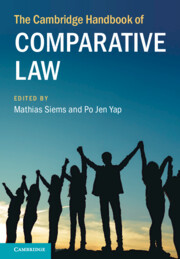Book contents
- The Cambridge Handbook of Comparative Law
- The Cambridge Handbook of Comparative Law
- Copyright page
- Contents
- Figures
- Tables
- Contributors
- Preface
- Abbreviations
- 1 Introduction
- Part I Methods of Comparative Law
- 2 Traditional Methods
- 3 Historical-Jurisprudential Methods
- 4 Critical Methods
- 5 Culture and Comparative Law Methodology
- 6 Linguistic Approaches
- 7 Qualitative Fieldwork
- 8 New Institutional Economics
- 9 Empirical Methods
- 10 Machine-Learning Methods
- Part II Legal Families and Geographical Comparisons
- Part III Central Themes in Comparative Law
- Part IV Comparative Law beyond the State
- Index
6 - Linguistic Approaches
from Part I - Methods of Comparative Law
Published online by Cambridge University Press: 26 January 2024
- The Cambridge Handbook of Comparative Law
- The Cambridge Handbook of Comparative Law
- Copyright page
- Contents
- Figures
- Tables
- Contributors
- Preface
- Abbreviations
- 1 Introduction
- Part I Methods of Comparative Law
- 2 Traditional Methods
- 3 Historical-Jurisprudential Methods
- 4 Critical Methods
- 5 Culture and Comparative Law Methodology
- 6 Linguistic Approaches
- 7 Qualitative Fieldwork
- 8 New Institutional Economics
- 9 Empirical Methods
- 10 Machine-Learning Methods
- Part II Legal Families and Geographical Comparisons
- Part III Central Themes in Comparative Law
- Part IV Comparative Law beyond the State
- Index
Summary
Language and translation are fundamental to comparative law not only as materials and tools in comparisons but also as determinants of methodological choices. Their importance has been largely downplayed in comparative law and it was not until recently that they were acknowledged more explicitly by interdisciplinary postmodern comparative methods. This chapter discusses linguistic approaches to comparative law which foreground the issues of language and translation in comparisons, relying on insights from legal linguistics and legal translation studies. The chapter first discusses methodological developments in comparative law and linguistics which have facilitated this shift. It presents cognitive and communicative aspects of legal semantics and their implications for the depth of comparisons. The chapter next centres on theoretical foundations of and approaches to legal translation in a variety of intersystemic, intrasystemic and hybrid contexts. The final section gives an overview of legal linguistic comparisons beyond the term level, focusing on genres and Eurolects. In conclusion, it is argued that linguistic approaches should be integrated more systematically, triangulated with other comparative law methods and supported by empirical research.
- Type
- Chapter
- Information
- The Cambridge Handbook of Comparative Law , pp. 91 - 112Publisher: Cambridge University PressPrint publication year: 2024
- 2
- Cited by

